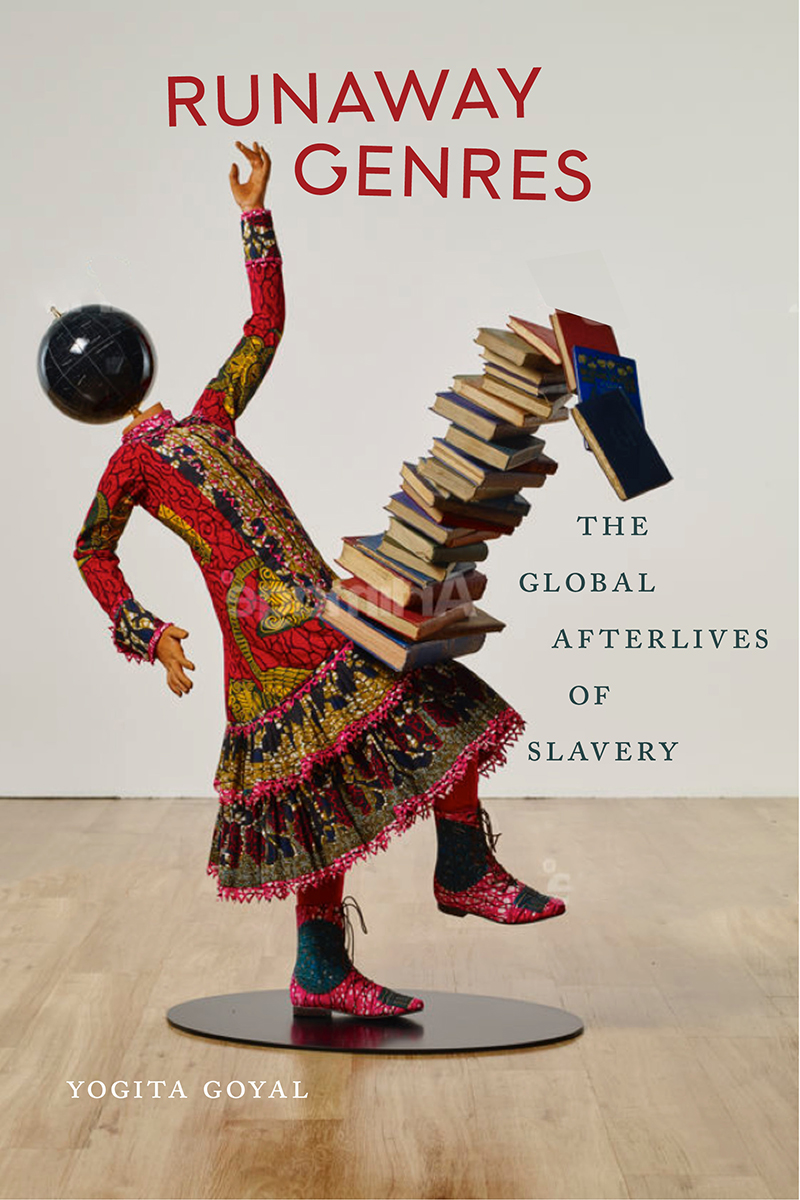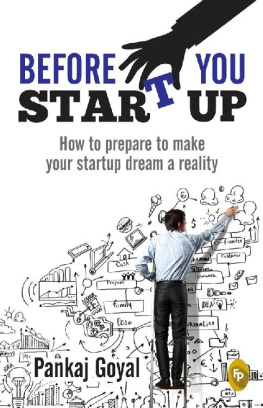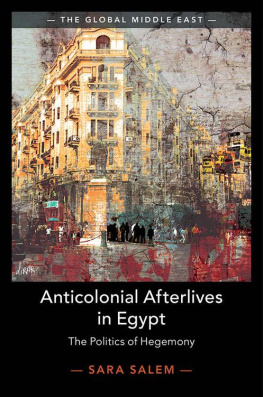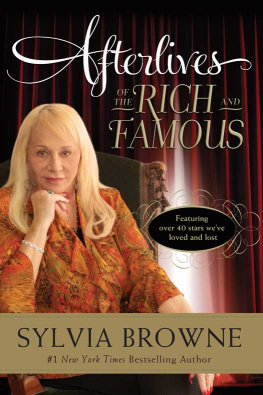Yogita Goyal - Runaway genres : the global afterlives of slavery
Here you can read online Yogita Goyal - Runaway genres : the global afterlives of slavery full text of the book (entire story) in english for free. Download pdf and epub, get meaning, cover and reviews about this ebook. year: 2020, publisher: New York University Press, genre: Art. Description of the work, (preface) as well as reviews are available. Best literature library LitArk.com created for fans of good reading and offers a wide selection of genres:
Romance novel
Science fiction
Adventure
Detective
Science
History
Home and family
Prose
Art
Politics
Computer
Non-fiction
Religion
Business
Children
Humor
Choose a favorite category and find really read worthwhile books. Enjoy immersion in the world of imagination, feel the emotions of the characters or learn something new for yourself, make an fascinating discovery.

- Book:Runaway genres : the global afterlives of slavery
- Author:
- Publisher:New York University Press
- Genre:
- Year:2020
- Rating:4 / 5
- Favourites:Add to favourites
- Your mark:
- 80
- 1
- 2
- 3
- 4
- 5
Runaway genres : the global afterlives of slavery: summary, description and annotation
We offer to read an annotation, description, summary or preface (depends on what the author of the book "Runaway genres : the global afterlives of slavery" wrote himself). If you haven't found the necessary information about the book — write in the comments, we will try to find it.
Runaway genres : the global afterlives of slavery — read online for free the complete book (whole text) full work
Below is the text of the book, divided by pages. System saving the place of the last page read, allows you to conveniently read the book "Runaway genres : the global afterlives of slavery" online for free, without having to search again every time where you left off. Put a bookmark, and you can go to the page where you finished reading at any time.
Font size:
Interval:
Bookmark:

Yogita Goyal

NEW YORK UNIVERSITY PRESS
New York
NEW YORK UNIVERSITY PRESS
New York
www.nyupress.org
2019 by New York University
All rights reserved
References to Internet websites (URLs) were accurate at the time of writing. Neither the author nor New York University Press is responsible for URLs that may have expired or changed since the manuscript was prepared.
Library of Congress Cataloging-in-Publication Data
Names: Goyal, Yogita, author.
Title: Runaway genres : the global afterlives of slavery / Yogita Goyal.
Description: New York : New York University Press, [2019] | Includes bibliographical references and index.
Identifiers: LCCN 2019006929| ISBN 9781479829590 (cl : alk. paper) | ISBN 9781479832712 (pb : alk. paper)
Subjects: LCSH: SlaveryHistory. | African diaspora. | GlobalizationSocial aspectsAfricaHistory.
Classification: LCC HT861 .G69 2019 | DDC 306.3/6209dc23
LC record available at https://lccn.loc.gov/2019006929
New York University Press books are printed on acid-free paper, and their binding materials are chosen for strength and durability. We strive to use environmentally responsible suppliers and materials to the greatest extent possible in publishing our books.
Manufactured in the United States of America
10 9 8 7 6 5 4 3 2 1
Also available as an ebook
For my father
in memoriam
Madan Lal Goyal
Something new is beginningor perhaps something old and nasty is reviving.
Octavia Butler, Parable of the Sower
Some twenty-five years ago, Toni Morrison lamented that there was no suitable memorial to slavery in the United Statesno plaque or wreath [or] three hundred foot tower, not even a small bench by the road. Explaining how she wrote Beloved to counteract this national amnesia and urge to erasure, Morrison claimed that because such a place does not exist (that I know of), the book had to. Now, however, slavery is seemingly everywhere, in every form, a fit subject for solemn memorials, irreverent comedy, imaginative reconstruction, an allegory of contemporary racial politics, or an enterprise of painstaking fact finding for historians. In other words, slavery is now the site for the reinvention of form.
That slavery offers immense aesthetic and political resources to contemporary African American writers is not at all surprising. After all, current forms of inequality and race-based discrimination can easily be traced back to slavery, as both institutional and psychic afterlives, as structures and as structures of feeling. And the fields of art, literature, history, and political theory have all been transformed by the study of slavery and its varied afterlives. In literature, especially, the dominance of the neo-slave narrative over the last four decades as the paradigmatic mode for thinking about African American identity and history is now axiomatic. Such writers as Dionne Brand, Octavia Butler, Fred DAguiar, Bernardine Evaristo, Marlon James, Charles Johnson, Edward Jones, Gayl Jones, Andrea Levy, James McBride, M. NourbeSe Philip, Caryl Phillips, Alice Randall, Colson Whitehead, and Sherley Anne Williams have satisfied Morrisons call and fully memorialized slavery and its constitutive role in any conception of the nations past, present, and future. Moreover, philosophies of history derived from slavery, inquiries into practices of archival recovery, studies of racial capitalism, and debates about ethics and affect have assumed center stage in current scholarship. The extensive activism around prison abolition and ending mass incarceration, to take just one example, substantiates a clear understanding of the foundational role of slavery and its incomplete abolition in the discriminatory laws that shape current US carceral regimes. In recent years, debates about reparations, Confederate statues, and antebellum nostalgia, calls for accounting for the universitys connection to slavery, and renewed attention to ideologies of white supremacy and antiblackness have all helped shape the volatile afterlife of slavery in the political sphere.
But slavery appears in more than such historical or memorial garb. Slavery, in fact, frames a range of contemporary phenomena across the globe: from human trafficking to illegal immigration, from conscription in war as a child soldier to forced marriage, from debt bondage to domestic servitude. Such parallels to the transatlantic slave trade proliferate in contemporary culture, demanding new ways of understanding racial formation across past and present landscapes, and in relation to new geographies of terror and containment. Runaway Genres tracks the emergence of slavery as the defining template through which current forms of human rights abuses are understood in order to rethink race in a global frame. Neo-abolitionist movements to end child labor, human rights campaigns against human trafficking and supportive of the rights of refugees and asylum seekers, feminist efforts to end the exploitation of sex workers, populist advocacy for animal rights, antiabortion efforts, activism against incarceration, discrimination based on caste, and the abuse of migrant labor all make rampant use of slavery to elicit support for their cause. And to do so, they rely on the same power of narrative that abolitionists once did. As one Boston editor put it in 1840, Argument provokes argument, reason is met by sophistry; but narratives of slaves go right to the hearts of men.
Continuing this appeal to the hearts of men, writers across the globefrom India to Ireland, Nigeria to Uganda, Haiti to South Africa, Sri Lanka to Sierra Leoneare reviving the slave narrative, a clearly
To answer these questions, I locate the global proliferation of the slave narrative at the confluence of three forces: increasing large-scale migration, the ongoing appeal of sentimentalism to narrate trauma, and a historical tendency to see current events as repetitions of the past. The slave narrative, a story of escape from bondage, presented as a sentimental appeal to the readers empathy, often vouched for by a sympathetic white editor, uncannily matches contemporary accounts of refugees, asylum seekers, survivors of trafficking and conscription in war. What W. E. B. Du Bois memorably called the most magnificent drama in the last thousand years of human historythe large-scale transportation of Africans to the Americasseems replicated in the scale and trauma of contemporary migrations. In an age when feeling, affect, and empathy appear as substitutes for social change, the sentimental idiom favored by abolitionists comes in handy to narrate stories of oppression from the Global South. The conditions of empathetic reader and traumatized survivor neatly mirror those of the slave narrative. Returning to the pastby replaying tropes of the slave narrative, including accounts of exile and natal alienation, the concept of social death, the quest for literacy, the journey north to freedom, and dreams of the Jubileecontemporary literature chronicles the history of violence in a world that has not yet figured out a politics of reconciliation or reckoning.
Reading for the transformation of the slave narrative in contemporary fiction and nonfiction, I explicate as well as question the ways in which slavery remains at the heart of many models of transnational blackness. Because slavery has become a figure for contemporary inequality, an examination of the ghosts of past inequities not yet laid to rest, such returns to the past as much speak to a desire to understand history as they frame the possibilities of the present and the future. In exploring the contradictory uses of historical violence for contemporary politics, we need to not only return to the question of what slavery itself means but also account for how and when the slave narrative became malleable as a global form, available for adaptation across time and space.
Next pageFont size:
Interval:
Bookmark:
Similar books «Runaway genres : the global afterlives of slavery»
Look at similar books to Runaway genres : the global afterlives of slavery. We have selected literature similar in name and meaning in the hope of providing readers with more options to find new, interesting, not yet read works.
Discussion, reviews of the book Runaway genres : the global afterlives of slavery and just readers' own opinions. Leave your comments, write what you think about the work, its meaning or the main characters. Specify what exactly you liked and what you didn't like, and why you think so.







